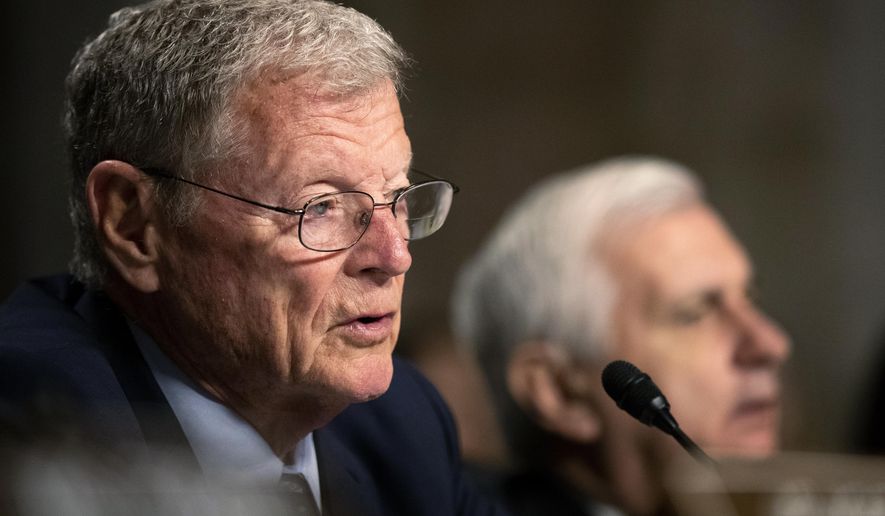The chairman of the Senate Armed Services Committee is sounding the alarm that the impeachment process is taking critical time and attention away from negotiations to get the massive 2020 defense policy bill across the finish line.
With time running out on this legislative session and a presidential election looming in 2020, the Democratic House and the Republican-led Senate have encountered repeated obstacles in reaching a deal on the 2020 National Defense Authorization Act (NDAA), which sets out a broad spending and policy blueprint for the Pentagon for the next year.
Traditionally a bipartisan exercise even in the most contentious of times, passage of this year’s NDAA has been caught up in the polarizing fight over President Trump’s fate.
“It concerns me to see Democrats prioritizing their misguided attempts to undo the results of the 2016 election through impeachment, instead of taking care of our troops with an NDAA,” Senate Armed Services Committee Chairman James M. Inhofe said in an impassioned speech on the Senate floor last week.
The Oklahoma Republican’s comments came just days before House Democrats announced public impeachment inquiry hearings that are set to take place this week.
“If we can’t get our defense authorizations free [from] the partisan gridlock, what kind of a message does that send Americans who rely on our troops for protection?” Mr. Inhofe warned. “For our adversaries, this dysfunction is exactly what they want. They want defense funding mired in partisan debate.”
Mr. Inhofe warned that if the House were to send the Senate articles of impeachment this year it would “eat up all of our time in December, and it could spill into January.” As of Monday, the House and Senate together have 16 legislative days left this year.
Frustration between both parties on either side of Capitol Hill has been mounting as Republicans and Democrats appear to be unwilling to come together on divisive issues in the NDAA, in particular the Republicans’ plan to again tap defense accounts to help finance Mr. Trump’s Mexico border wall. Even a stripped-down “skinny” bill, punting on the most divisive issues, is having trouble winning support as time winds down.
“Now nobody wants a skinny bill, but we may end up with a skinny bill,” Mr. Inhofe said.
House Democrats say they are determined to block the wall funding, while Republicans insist that President Trump won’t sign a bill that does not address his top immigration priority. The impasse contributed to several key missed deadlines, and led to enforcing a temporary stopgap spending bill for the military that expires on November 21.
The standstill could pressure Congress to enact an additional “continuing resolution” for the entire 2020 federal fiscal year — a possibility that both lawmakers and the Pentagon’s top brass have warned against.
From training and weapons modernization to facing the growing challenge from rival such as China, “I think all of those will be negatively [impacted] unless we get the full budget passed,” new Joint Chiefs of Staff head Gen. Mark Milley told lawmakers this summer.
Pentagon data obtained by The Times shows that the production of various vehicles and weapons systems for the Army, including the UH-60 Black Hawk helicopter and hellfire missiles, worth over $1 billion would be suspended under if the stopgap spending plan is extended.
The Defense Department last week announced additional Air Force and Navy projects that would be delayed including the development and production of the F-15EX aircraft, and could lead to operation and maintenance shortfalls for 14 Navy ships.
Such an outcome would be an “absolute disaster,” Mr. Inhofe said ahead of his floor speech last week. “It’s throwing in the towel. It’s quitting when our troops need us most.”
Rhode Island Sen. Jack F. Reed, the ranking Democrat on the Armed Services panel, agree that failure to cut a deal on the NDAA would be a “detrimental effect particularly on the Department of Defense,” but he believes that both sides are working hard to avoid that outcome.
Mr. Inhofe, however, said he has not been making progress on negotiations with Democrats “because they’re not here.”
House members last week participated in a Congressional delegation to Iraq and Turkey amid tensions in the region.
“I wished that, you know, obviously that they would have taken another time to take the trip and done this,” he continued.
House Majority Leader Rep. Steny H. Hoyer, Maryland Democrat, reportedly is planning to take up a continuing resolution the week of Nov. 18, just days before the current resolution expires.
• Lauren Toms can be reached at lmeier@washingtontimes.com.




Please read our comment policy before commenting.